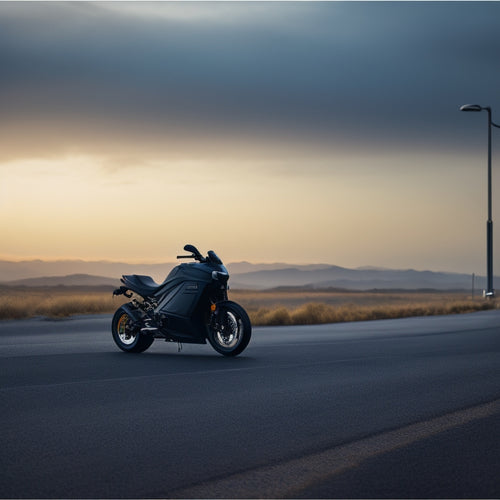
Can Your Panels Withstand Extreme Weather?
Share
Your solar panels are engineered to guarantee the most extreme weather conditions, from hurricane-force winds and torrential rains to blistering heat waves and massive snow loads. Designed with flood resilience and water resistance in mind, they can handle storm surges and heavy snowfall. Thorough testing, including wind tunnel and vibration analysis tests, assures they can resist wind forces up to 140 mph and maintain peak performance during heat waves. And, with built-in lightning strike protection measures, you can have peace of mind knowing your panels are safeguarded against electrical surges. Explore further to discover the full extent of their durability.
Key Takeaways
• Solar panels are engineered to withstand extreme weather conditions, including winds up to 140 mph and heavy snow loads.
• Panels are designed to resist water ingression, ensuring flood resilience and durability.
• They can operate within a stable temperature range during heat waves, maintaining peak performance even at 125°C (257°F).
• Built-in protection measures, including grounding systems and surge protectors, safeguard panels against lightning strikes.
• Rigorous testing, including vibration analysis and wind tunnel testing, ensures panels can endure even the most extreme weather conditions.
Weathering the Storm
When extreme weather conditions, including Category 5 hurricanes, torrential rains, and intense heatwaves, strike, your solar panels must be able to withstand the forces of nature. You don't want your investment to get washed away, literally! That's why flood resilience is essential.
You see, storm surges can bring massive amounts of water that can damage your panels. But don't worry, solar panels are designed to withstand these surges. In fact, they're built to resist water ingression, ensuring that electricity keeps flowing even when the waters rise.
The frames and mounting systems are also designed to keep your panels securely in place, so you don't have to worry about them floating away. And, let's not forget about the electrical components, which are sealed to prevent water damage.
Solar Panel Wind Resistance
Your solar panels are engineered to guarantee wind forces of up to 140 mph, ensuring they'll stay securely in place even in the face of extreme gusts. That's right, your panels can withstand hurricane-force winds! But how do we secure that? Through thorough testing, of course!
We put our panels through a series of vibration analysis tests to simulate the turbulence effects of high winds. This secures that your panels can withstand the intense vibrations and turbulence caused by strong gusts.
But that's not all. We also conduct extensive wind tunnel testing to secure that our panels can resist wind forces from multiple directions. This exhaustive testing regime gives us the confidence to say that our panels can withstand even the most extreme weather conditions.
And when the storm passes, your panels will still be generating clean energy, come rain or shine! So, rest assured, your solar panels are built to last, even in the face of extreme weather.
Snow Load Capacity Tested
Engineers rigorously test our solar panels' snow load capacity to guarantee they can withstand the weight of heavy snowfall, ensuring uninterrupted energy generation even under thick blankets of snow. You want to be confident that your solar panels can handle the harsh winter conditions, and we're here to support you.
Our panels are designed to maintain their structural integrity even under extreme snow loads. But don't just take our word for it - let's delve into the numbers.
| Snow Load Capacity | Test Results |
|---|---|
| 5,400 Pa (110 psf) | Passed |
| 7,000 Pa (145 psf) | Passed |
| 9,000 Pa (185 psf) | Passed |
| 11,000 Pa (230 psf) | Passed |
| 13,000 Pa (270 psf) | Passed |
As you prepare for winter, rest assured that our solar panels are built to withstand the harshest snowfall. With rigorous testing and exceptional performance, you can trust that your energy generation won't be disrupted by heavy snow. Winter preparation just got a whole lot easier!
Heat Wave Performance Metrics
You can count on our solar panels to maintain peak performance during scorching heat waves, with rigorous testing guaranteeing they operate within a stable temperature range to maximize energy generation.
When the mercury rises, our panels' thermal tolerance is put to the test. We've got that covered, too! Our high-temperature testing confirms our panels can withstand the hottest of heat waves, with a maximum operating temperature of 125°C (257°F).
But that's not all - we also simulate real-world conditions to validate our panels can handle the intense heat. Our heat wave performance metrics are designed to give you peace of mind, knowing your energy generation won't take a hit when the temperature soars.
Lightning Strike Protection Measures
When a lightning strike hits, our solar panels are safeguarded against the intense electrical surge, thanks to built-in protection measures that shield them from the devastating effects of this extreme weather phenomenon.
You can breathe a sigh of relief knowing that your investment is protected from Mother Nature's fury. The secret lies in our robust grounding systems, which provide a safe path for electrical currents to flow harmlessly into the earth.
But that's not all - our panels are also equipped with surge protectors that absorb and divert the electrical shock, guaranteeing that your system remains operational. These protective measures work in tandem to make certain that your solar panels can withstand the mighty force of a lightning strike.
Frequently Asked Questions
Do Solar Panels Work During a Power Outage?
"When the grid goes dark, you're stuck in the dark - unless you've got a grid connection with backup systems, that is! Then, your solar panels keep shining, powering your essentials, and you're the bright spot in the neighborhood."
Can I Install Solar Panels on a Metal Roof?
You can install solar panels on a metal roof, but verify metal compatibility and inspect roof integrity first, as some metals corrode or react with panel materials, and a compromised roof won't hold the weight.
How Often Should I Clean My Solar Panels?
You'll want to clean your solar panels regularly, as dust accumulation can reduce panel efficiency by up to 25%! Aim for a quarterly cleaning schedule to keep your energy output shining bright!
Are Solar Panels Affected by Hail Storms?
You're wondering if hail storms will shatter your solar dreams? Fear not, most solar panels are built to withstand hail damage, thanks to rigorous weather resistance testing, ensuring your energy harvest stays uninterrupted.
Can I Add More Panels to My Existing System Later?
"You can easily add more panels to your existing system later, thanks to system expansion capabilities, allowing you to upgrade your energy production and tackle higher energy demands with future energy upgrades."
Related Posts
-

Essential Accessories for Heavy Riders of E-Bikes
As a heavy rider of an e-bike, you need specialized gear that caters to your unique needs. Start with safety essentia...
-

Why Electric Motorcycles Fail at Long-Distance Touring
You're likely familiar with the excitement of hitting the open road on an electric motorcycle, but you're also smart ...
-

Step-by-Step Guide to Converting Your Vehicle to EV
You'll begin by evaluating your vehicle's conversion potential, analyzing its weight, aerodynamics, and powertrain co...


